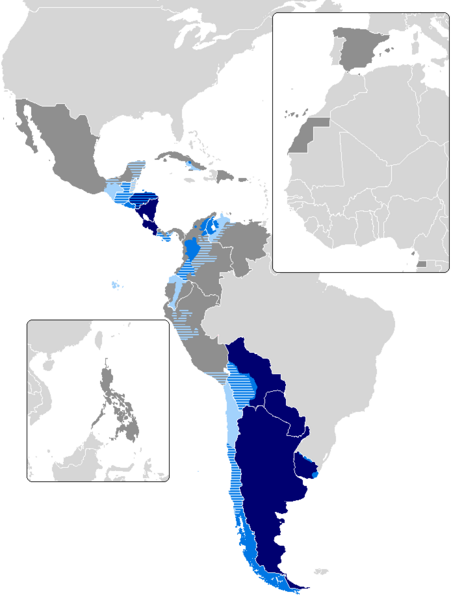For years I’ve intended to watch a telenovela, or Spanish-language soap opera. Like many people who learned Spanish as a second language, I find that listening is my weakest skill. I figured that sitting through hours of Spanish dialogue would help me.
A few months ago I finally took the plunge and watched La esclava blanca (‘The White Slave’) on Netflix. It was so much fun that I ended up binge-watching all sixty-two episodes.* This was bad for my physical health except for those episodes I watched while exercising. It also wasn’t as good for my listening skills as I had hoped, since I watched it with Spanish subtitles. Now that I know the plot perhaps I should rewatch it without subtitles…but I’d rather move on to a different series.
There was much to admire in La esclava blanca. The cast was terrific, especially the villain, who was played by a handsome Spanish actor with the improbable but delightful name Miguel de Miguel. His character was vile yet undeniably charming. The star-crossed lovers at the center of the plot were brave and bold. Over the course of the series the side characters became more compelling and interesting as they grew and changed, often in surprising ways. Finally, the story’s setting, in Colombia toward the end of that country’s slavery era, was engrossing. The show made it abundantly clear that slavery was a poison in Colombian society, harming not only the enslaved Blacks (obviously) but also their legal owners. As the show progressed, and the slave owners became more and more desperate to protect their way of life, they descended deeper and deeper into pure evil. The ultimate fate of Miguel de Miguel’s character illustrates this path most graphically. You’ll have to watch the show to find out more. Really, his last scene is a doozy.
The one thing that bothered me about the series is that the white heroine and the mixed-race hero, rather than the enslaved people of pure African descent, drove the movement toward liberation. This is an example of what is known as the “white savior” trope in which a white person leads or rescues a minority. Other examples are the movie Glory, which stars Matthew Broderick as the white commander of a Black regiment on the Union side in the Civil War, and Avatar, in which only a brave white human (an ex-Marine played by Sam Worthington) can rescue the blue Na’vi humanoids and their homeland on a verdant moon.
My complaint is not original. A Google search for “esclava blanca white savior” will find many other critiques along these lines.
So while I truly enjoyed this telenovela, the “white savior” issue stops me from recommending it with full enthusiasm.
Of course, I found much of linguistic interest in the series. I don’t know to what extent the features noted below are specific to Colombian Spanish.
- First and foremost, I am convinced that I heard some instances of words whose initial h was aspirated rather than silent. Two I wrote down, both in episode 33, were Qué va, hombre (shortly after 17:00) and Hola, Jesús (after 36:30). I’ve searched but haven’t found this described anywhere as a feature of Colombian Spanish.
- As with the n-word in English, the white and Black characters in La esclava blanca use negro/negra differently. For the whites it is an insulting noun, often followed by the adjective asqueroso ‘disgusting.’ For the Blacks it is affect-free, like man or bro in English.
- Speaking of man, the Black characters also use hombre when talking with pals. (I don’t remember whether the white characters do this too.) At 29:20 in episode 57, Julián even calls his girlfriend hombre, which amused me.
- The actors frequently drop the word a in sentences like Miguel va a comer ‘Miguel is going to eat,’ saying instead Miguel va comer. This makes perfect sense: the adjacent a vowels in va and a have simply blended. A is retained with other verb forms, as in Miguel y Elena van a comer.
- At 13:20 in episode 59 a character says Usted verá que no es lejos. I noticed other uses of ser instead of estar to describe location.
- At 43:45 in episode 61 I learned a new verb, engatusar, meaning ‘to con, deceive.’ According to Juan Corominas it has an unusual etymology that blends three roots: encantusar ‘to deceive with witchcraft,’ engatar (from gato) ‘to deceive with affection,’ and engaratusar ‘to deceive with praise.’
- Finally, while I have yet to realize my ambition of visiting a voseísta country like Colombia (i.e. one whose speakers use the pronoun vos instead of (or along with) tú), I really enjoy hearing voseo! In La esclava blanca I especially relished commands followed by pronouns, since these are identical to their tú equivalents except for the stressed syllable. Some examples are perdoname (instead of perdóname) and tranquilizate (instead of tranquilízate), whose te threw me for a loop until I checked the conjugation.
As always, I welcome comments. I would especially appreciate hearing from anyone who is familiar with Colombian Spanish.
——————————————-
*When I started watching the show I had no idea that it was so long. At first I figured that it would be fairly short because an important wedding was scheduled to take place in a few days. When the wedding kept being postponed I checked and saw that I still had dozens of episodes to go. By then it was too late to stop watching: I was thoroughly hooked.


